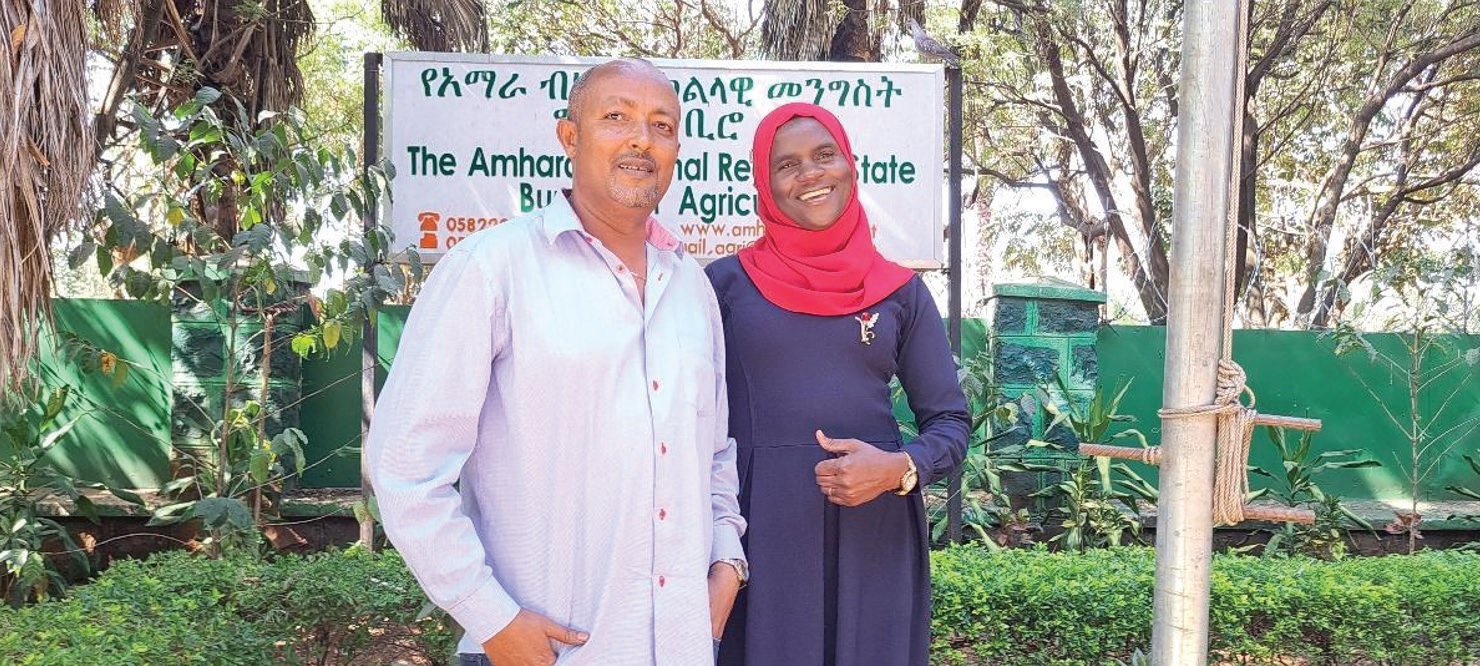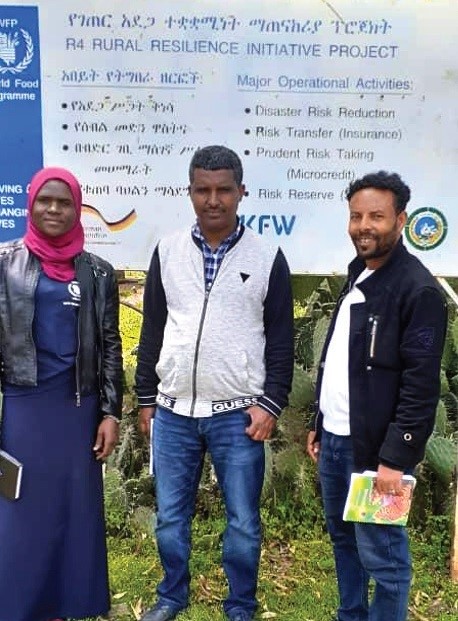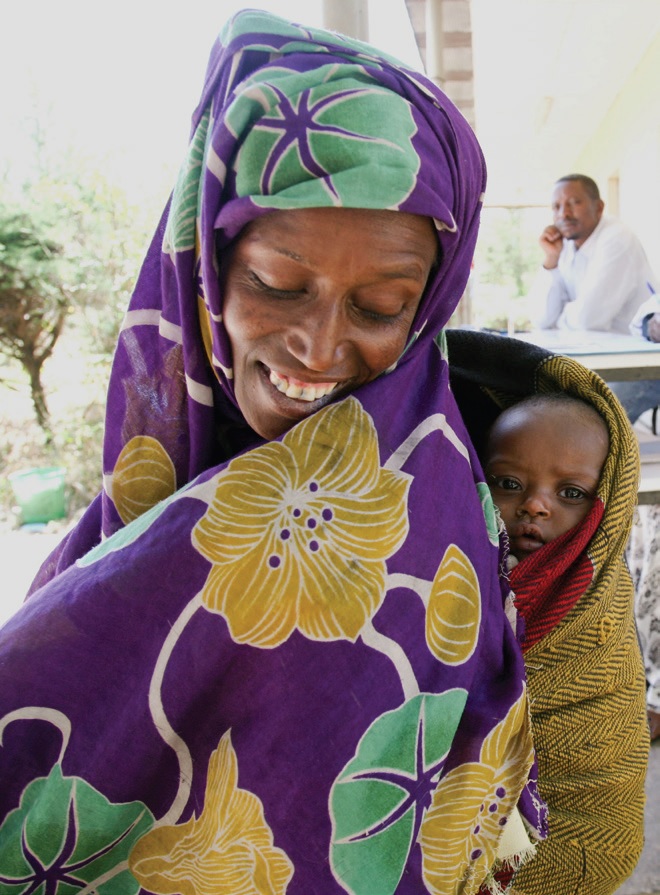
(Visited 135 times, 1 visits today)

Daniel Lemlem, an Ethiopian national, and Abeeba Banda, a Malawian national, are Future Generations University alumni of 2021 and 2019, respectively. Daniel and Abeeba met in 2019 when they were classmates. Little did they know they would meet again in person and work on the same project after graduation.
Currently, Daniel is the Technical Advisor on Crop Value Chain Development under the National Regional State Bureau of Agriculture (Amhara BoA) in Ethiopia. He also leads the Agriculture Learning and Policy Dialogue platform and co-leads the Agriculture Taskforce. Abeeba is a Programme Policy Officer (Consultant) for the United Nations World Food Programme in South Sudan. Previously, she worked as a Sustainable Livelihood Expert for the World Food Programme Ethiopia, under the Bahir Dar Area office, in the Amhara region.
Daniel and Abeeba met in person for the first time on August 30, 2022, at a project inception meeting organized by the World Food Programme and the Amhara Regional Bureau of Agriculture. Abeeba was introduced to the meeting participants as the one who coordinates the implementation of the Early Livelihood Recovery Support project from the World Food Programme side. Daniel was present as a representative from the Amhara Regional Bureau of Agriculture, the group that implements the Early Livelihood Recovery Support project.
“When I saw Abeeba, I asked myself, where did I see this lady? The name and the face look very familiar, but they had introduced her as someone who was new in Ethiopia. Later I recalled that we were attending the same courses at Future Generations University. During break time, I had a chat with her, and we were both excited that we managed to meet in person, and we happened to manage the same project,” Daniel said.
“My first meeting with Daniel was so exciting. This was my second day in the Amhara region, and I did not know anyone apart from my WFP office colleagues. The meeting with Daniel made me feel welcomed and at home since I now had a long-time friend. He introduced me to other people, and it made my work easier and more exciting. Future Generations gave me a brother workmate who made my stay in Ethiopia so memorable and exciting,” said Abeeba.


The World Food Programme (WFP) has implemented the R4 in Ethiopia since 2009. In 2023, the R4 was introduced in the Amhara region, where the first phase was implemented from 2013 to 2018. The second phase of the R4 was planned to be implemented from 2018 to 2022 but was disrupted in 2020 and 2021 due to tension in the Tigray region that spread to other parts of the Amhara region.
The conflicts led to displacement and damage to the assets, and some areas became inaccessible for the continuity of the R4 program. In addition, the ongoing war in Ukraine resulted in significant risks to the global and Ethiopian economy, which was already struggling with inflation, protracted drought, and the lasting impacts of the COVID-19 pandemic. This made most households become more vulnerable because the prices of most essential commodities continuously increased, and there was supply chain disruption.
In June 2022, UN World Food Programme signed a Memorandum of Understanding with the Amhara National Regional State Bureau of Agriculture (Amhara BoA) and the Amhara Regional Bureau of Finance and Economic Cooperation (Amhara BoFEC) to implement the Livelihood and Recovery Support Initiative, targeting R4 program beneficiaries in the Amhara region, Ethiopia. One hundred fifty-two thousand six hundred and twenty beneficiaries (30,524 households) were targeted for the LRS initiative that was initially planned to run from June 2022 to March 2023 but was extended to September 2023. The project goal is to improve the food and nutrition security of the vulnerable households of the R4 Programme in the Amhara region. The project is expected to restore and enhance agricultural production and productivity, restore incomes, and strengthen the livelihood and resilience of the targeted communities. The targeted households are being supported with seeds and fertilizer, livestock, and seed money for small-scale businesses, rehabilitation of the irrigation schemes as well as training and capacity building on different livelihood options and financial management.
The concepts of SEED-SCALE were used in the Livelihood and Recovery Support initiative, although not all steps were followed. The project was introduced based on evidence, not opinions. When the security situation improved in the area, consultations were conducted to understand the context and nature of the damage. It was noted that most of the community members returned to their places/communities and were willing to take a step in reviving their livelihood options. This was a success already happening in the community that enabled the introduction of the Livelihood and Recovery Support initiative. The project was also designed based on lessons learned from the community members (through the consultation) on the support they may be required to improve their living conditions, e.g., to be provided with fertilizer. The project is also going on well because of the partnerships since the community coordination committees were selected, and other stakeholders are also involved through the project task forces that were formed at the regional and district levels.
Read the latest dispatches from our team, stories of community-led transformation, updates on alumni and profiles of students as we work to create a more sustainable, just and equitable future. These voices center strength, hope and resilience, paving the way for everyone to participate in building Future Generations.